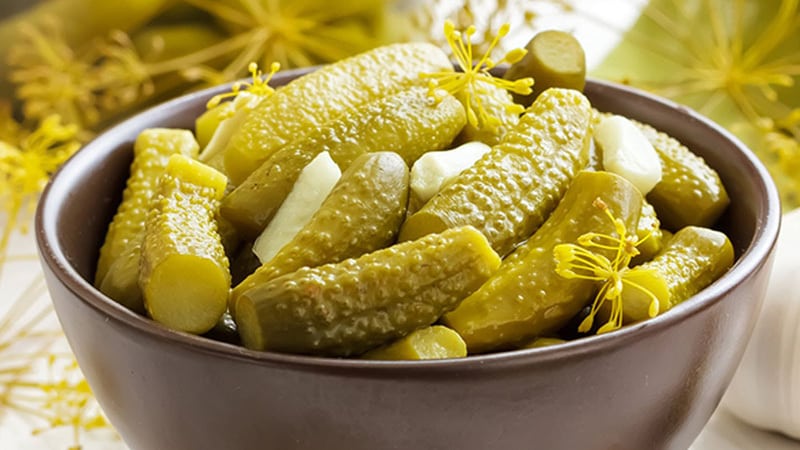Benefits, harms and calorie content of pickled cucumbers
It is difficult to imagine a person who has never tried pickled cucumbers. For many, this taste reminds of life in the village, where in a dark cellar there are real treasures in a row - all kinds of preparations for the winter. With the arrival of cold weather, they become a table decoration: an ingredient in salads, a tasty addition to boiled potatoes, or a snack for a fun feast.
Pickled cucumbers have long become an integral part of Slavic culture. But can they harm the body and can those on a diet eat such a snack? This is what we will look into.
How many calories are in cucumbers
On average, the calorie content of a fresh cucumber is 15 kcal per 100 grams. This is extremely small and is due to the fact that the vegetable consists of 95% water. It is classified as a low-calorie product, making fresh cucumbers the basis for a summer cucumber diet.
The calorie content of pickled cucumbers is even lower and is only 11.2 kcal per 100 g. During the pickling process, the vegetable becomes even more saturated with water and loses some calories. The longer the pickling process takes, the more dry matter the cucumbers will lose, which is not always good.
Interesting! The calorie content of pickled cucumbers is slightly higher and averages 16.1 kcal per 100 g. This is due to the fact that during the pickling process, the vegetable is saturated with less water than when salting, but more different seasonings are used.
Composition of pickled cucumbers
The main ingredients of cucumber preparation are water, salt and cucumbers.It may also contain special flavoring additives: garlic, horseradish, dill umbrellas, currant leaves and hot pepper.
The composition of pickled cucumbers is not much different from fresh ones. They contain potassium, phosphorus, calcium, zinc, magnesium. But the main element of pickles is, of course, sodium. Its content is so high (1111 mg) that only 150 g of cucumbers are enough to fully satisfy the body's daily need for salt. The most abundant vitamins are C, B1, B2 and PP.
An important difference between pickled cucumbers and fresh ones - the presence of lactic acid in them, formed during lactic acid fermentation. The lactobacilli contained in it are beneficial for humans: they improve digestion.
Due to the high water content, the BZH indicators (content of proteins, fats and carbohydrates) in cucumbers are barely noticeable.
100 g of salted vegetables contains 0.8 g of protein, 0.1 g of fat and 1.7 g of carbohydrates.
Benefits and harms
Pickled cucumbers have the following positive properties:
- Their spicy, salty taste stimulates the production of gastric juice and stimulates the appetite.
- Due to their high water content, pickles are low in calories.
- The content of lactic acid has a beneficial effect on the intestinal microflora.
- The high sodium content satisfies the daily salt requirement.
- They have a mild laxative effect.
However, cucumbers also have a number of negative properties, mainly associated with increased salt concentration:
- The high acidity of the brine can damage tooth enamel.
- Excessive consumption of salted vegetables can lead to fluid retention in the body.
- Makes it difficult for the kidneys to function.
Contraindications
People with the following diseases should take special care when consuming pickles:
- ulcers, gastritis and other diseases of the gastrointestinal tract;
- hypertension;
- kidney and liver diseases;
- tendency to diarrhea.
Negative consequences can be easily avoided if you do not overuse cucumbers, no matter how tasty they are. This is still a snack, not a full meal. It is recommended to rinse the cucumbers before eating: this will wash away excess brine and reduce their acidity.
Read also:
Recipes for cucumbers and apples for the winter.
Conclusion
Salt cucumbers for the winter - a good tradition of our ancestors, which many observe to this day. They can easily become a part of summer in the cold season, when fresh vegetables become a luxury. Pickled cucumbers find their place at any feast.
However, as with any snack, you need to use moderation with them. Uncontrolled eating of the product can lead to problems with the digestive system and kidneys. If not abused, cucumbers are harmless and even beneficial for our health. Compliance with moderation in everything is an excellent motto for gourmets and not only!